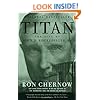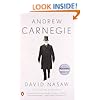



The First Tycoon: The Epic Life of Cornelius Vanderbilt Paperback – April 20, 2010
| Amazon Price | New from | Used from |
|
Hardcover, Deckle Edge
"Please retry"
|
$23.83 | $4.09 |
|
Audio CD
"Please retry"
|
—
|
— | — |
|
Unknown Binding
"Please retry"
|
—
|
$54.97 | $54.97 |

Don't have a Kindle? Get your Kindle here, or download a FREE Kindle Reading App.
Want to know our Editors' picks for the best books of the month? Browse Best Books of the Month, featuring our favorite new books in more than a dozen categories.
Product Details
Would you like to update product info or give feedback on images?.
|
Editorial Reviews
Amazon.com Review
A gripping, groundbreaking biography of the combative man whose genius and force of will created modern capitalism.
Founder of a dynasty, builder of the original Grand Central, creator of an impossibly vast fortune, Cornelius “Commodore” Vanderbilt is an American icon. Humbly born on Staten Island during George Washington’s presidency, he rose from boatman to builder of the nation’s largest fleet of steamships to lord of a railroad empire. Lincoln consulted him on steamship strategy during the Civil War; Jay Gould was first his uneasy ally and then sworn enemy; and Victoria Woodhull, the first woman to run for president of the United States, was his spiritual counselor. We see Vanderbilt help to launch the transportation revolution, propel the Gold Rush, reshape Manhattan, and invent the modern corporation—in fact, as T. J. Stiles elegantly argues, Vanderbilt did more than perhaps any other individual to create the economic world we live in today.
In The First Tycoon, Stiles offers the first complete, authoritative biography of this titan, and the first comprehensive account of the Commodore’s personal life. It is a sweeping, fast-moving epic, and a complex portrait of the great man. Vanderbilt, Stiles shows, embraced the philosophy of the Jacksonian Democrats and withstood attacks by his conservative enemies for being too competitive. He was a visionary who pioneered business models. He was an unschooled fistfighter who came to command the respect of New York’s social elite. And he was a father who struggled with a gambling-addicted son, a husband who was loving yet abusive, and, finally, an old man who was obsessed with contacting the dead.
The First Tycoon is the exhilarating story of a man and a nation maturing together: the powerful account of a man whose life was as epic and complex as American history itself.
Excerpts from an Interview with T.J. Stiles
 Question: Your last book was a biography of Jesse James. What drew you to Cornelius Vanderbilt as your next subject?
Question: Your last book was a biography of Jesse James. What drew you to Cornelius Vanderbilt as your next subject? T.J. Stiles: I was drawn by who he was as a person, the lack of writing about him, and the historical themes that defined his life.
Like Jesse James, Vanderbilt was man of action--decisive, dramatic, and always interesting. He courted physical danger, fought high-stakes financial battles, and always set the terms of his existence. Like Jesse James, Vanderbilt has not been the subject of much serious research. And like Jesse James, Vanderbilt opened a window on the making of modern America. Vanderbilt was central to the rise of the corporation, the emergence of Wall Street, and the birth of big business. His was a dramatic life played out on an enormous stage.
Q:How long have you been working on this book and what kind of research went into it?
TJS: I worked on it for more than six years. My research was challenging because Vanderbilt kept no diary, preserved no letters, and left behind no collection of papers. Second, the last serious biography about him was written in 1942. The increasing digitization of newspapers and Congressional documents helped, but I did most of my work the old-fashioned way, digging through archives and sitting in front of microfilm readers. My biggest discovery came when I stumbled upon the Old Records Division of the New York County Clerk’s Office; I spent months there going through original lawsuit papers from as early as 1816. I uncovered entire episodes of Vanderbilt’s life that no one ever suspected--fistfights, steamboats ramming each other, inside trading and noncompetition agreements, details about his physical office and epic tales of betrayal. I also focused on Vanderbilt’s associates and rivals, and found priceless letters about him in their papers. Of course, I spent months more going through the papers of his various railroad corporations at the New York Public Library. I found so much new material that I decided to include a lengthy bibliographical essay.
Q:Throughout the book, you highlight Vanderbilt's role in the making of the modern idea of economic regulation. You also write, "The Commodore’s life left its mark on Americans’ most basic beliefs about equality and opportunity." Where in our modern institutions do you think his legacy is most apparent?
TJS: Vanderbilt early on voiced a political philosophy rooted in radical Jacksonianism. He believed in individual equality, in the right to compete freely. He denounced monopolies and corporations. This strain of thought remains a key part of American values. Yet he ended his life at the pinnacle of an incredibly unequal society, the master of a giant corporation that overshadowed almost every other business in America. That late-life transformation strongly influenced the new acceptance of government regulation that arose after the Civil War. I don’t think so much that Vanderbilt’s legacy can be seen in our institutions as much as our economic culture--the rise of the modern idea that government should intervene to regulate large businesses, and redress the balance of wealth and power in society.
Q: What do you think Vanderbilt would have to say about our current economic climate; its root causes as well as the ever increasing bail-outs of giant corporations?
TJS: When the Panic of 1873 hit, Vanderbilt gave an immediate analysis to a newspaper reporter that virtually describes the current situation. The problem was asset inflation: a speculative bubble (in his case, railroads, in our case, real estate) that tamped down skepticism about the value of securities issued by overvalued companies (or, in our case, mortgage-backed securities based on shaky home loans). Eager to ride the rising wave, banks in New York marketed the securities abroad, giving a stamp of approval, much as they have done with mortgage-backed securities today. In other words, Vanderbilt would have understood the root causes of our crisis, despite the great differences in the economy between then and now. And, though he usually looked askance at government intervention, the seriousness of the situation might have led him to approve of strong action. It’s hard to say, because he denounced subsidies, yet after the Panic of 1873 he also urged the federal government to pump new money into the economy. In any case, he would have had a sophisticated grasp of our conundrum.
Q:Your own family history recently made national news when it was discovered, at The Smithsonian in Washington, DC, that one of President Lincoln's watches contained a secret inscription from your great-great grandfather. That must have been pretty exciting for you, not only as a family member but as a historian who has written extensively about the Civil War. How do you feel about this news and what do you make of all the attention it received?
TJS:The news accounts floored me. I never expected this favorite family story, one I never quite believed, to enter national mythology. My great-great-grandfather, Jonathan Dillon, was an Irish immigrant who was working in a Washington, D.C., watch repair shop when Fort Sumter was fired on. He happened to be holding Lincoln's watch in his hand. He made an inscription on the back of the dial, closed it up, and said nothing to Lincoln about it. My second cousin, Douglas Stiles, tracked the watch to the Smithsonian's Museum of American History, and convinced the director to open the watch up and check. The message was there--a little different from my great-great-grandfather's memory, but it was there.
I think it struck a chord with the nation at the moment of Lincoln's bicentennial. Here was a plucky, immigrant watchmaker who left a silent message of encouragement in Lincoln's pocket. No fanfare, nothing attention grabbing, just a patriotic, very human little act. I grew up with this story, and named my own son Dillon, in a kind of chain tribute to Jonathan Dillon, the watchmaker. (My father's middle name is Dillon, and of course it was my great-grandmother Isabella Dillon's maiden name.) When he was born in 2007, I often told the story about Lincoln's watch. If I had my doubts about it, I figured that no one would dare tear open Lincoln's watch to check. Glad they did.
As a historian, I found it particularly startling to be brought so close to perhaps the most important American of any era. I wrote about Lincoln in The First Tycoon. Now I know that, as he held an urgent conference with Cornelius Vanderbilt over how best to deal with the Confederate ironclad Merrimack, he might have had in his pocket a secret message from my great-great-grandfather. The story adds an immediacy to the past, showing how close any one of us is to great historical events.
(Photo © Joanne Chan)
--This text refers to the Hardcover edition.From The New Yorker
Copyright ©2008
More About the Author
Photo credit: Joanne Chan
Customer Reviews
Most Helpful Customer Reviews
Even though he was known as the king of the railroad, he was much more than that: he was the king of the steamboats and ships, and the king of industries and corporations as well. He built the original Grand Central Terminal in New York, and also the mighty New York Central Railroad system connecting New York with Chicago.
This tycoon also had his share of pains, disappointments, sadness, and regrets that life offers all mortals. His son Cornelius Jeremiah's addiction to gambling and also the affliction of epilepsy greatly distressed him.
Written in simple and lucid prose, the book is gripping and entertaining to the very end: "Vanderbilt was an empire builder, the first great corporate tycoon in American history. Even before the United States became a truly industrial country, he learned to use the tools of corporate capitalism to amass wealth and power on a scale previously unknown, creating enterprises of unprecedented size."
Mr. T. J. Stiles has written a marvelous biography of Cornelius Vanderbilt. Reading this book was a joy.
What compelled me to post a review this early in the process, is the flood of negative ratings - most (if not all) of which are about the e-book's pricing, not the book itself. Those criticisms, however understandable, have little to do with the substance of the book. This book and its author deserve better than that.
Ignore the "one star" reviews of those who were complaining about the Kindle product (probably all the same person). Very sad when the review process is hijacked by cheaters.
Born during George Washington's presidency, Vanderbilt built a massive business empire starting with steamships and then railroads. His life spanned an epic period of the growth of the United States. During his life he saw New York grow from a population of 40,000 to over 1 million, the introduction of the railroad and steamships, building the Erie canal, the gold rush, the telegraph, and the American civil war.
Vanderbilt comes across as tenaciously driven in business, opportunistic, and personally aloof. During the development of the country during the 18th century, Vanderbilt was always there -capitalizing upon and in turn, providing the infrastructure that enabled the country's growth.
Vanderbilt's response to the California gold rush of 1849 is illustrative. He built a steamship line that transported passengers to the east coast of Nicaragua, transferred them to a small riverboat for the trip up the San Juan river. Shipped and reassembled a larger ferry boat for the trip across Lake Nicaragua, and then used pack animals to make the 12 miles trip to the Pacific. Finally, another steamship took them to San Francisco. Doing so required political deftness, engineering expertise, financial backing, and a keen business acumen.
Vanderbilt then began shifting his business from steamships to railroads. Shortly after the civil war he had essentially shifted his entire business focus away from steamships to railroads.
I wondered how he made these decisions. Did he ponder long and hard the future of the country and decide where he needed to be? How did he see these changes coming?Read more ›











